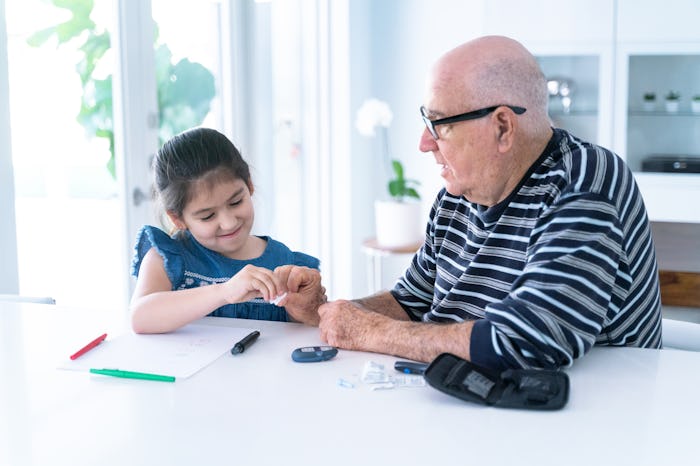Life

Should You Stop Visiting Grandparents During The Coronavirus Pandemic?
My kids see their grandparents (and sometimes great-grandparents) on an almost weekly basis, but due to the increased risk for COVID-19 in elderly individuals, I may be forced to re-think our usual visits. Visiting grandparents during the coronavirus pandemic just seems less safe with all of the new information coming out, but is it necessary?
Dr. Niket Sonpal, a New York-based internist and gastro tells Romper that doctors are still figuring out the role of children as carriers of coronavirus. But, he recommends to err on the side of precaution when it comes to older relatives.
"We know that the elderly are at a heightened risk for contracting the virus and then suffering complications," he says. "Common sense would suggest that if a child has any cold or respiratory symptoms, even if just mild, they should be separated from grandparents or relatives with chronic illnesses or compromised immune systems."
Typically, children do only experience mild symptoms from coronavirus, according to pediatrician Dr. Whitney Casares, and she tells Romper that doctors are "continuing to learn more about COVID-19 as we see more and more cases in the United States." But what if grandma and grandpa balk at your insistence to keep the children away? After all, they're adults and should be able to make their own choices about their exposure, right?
"It is important for families to stress to the older relatives that this is a preventative measure decided upon with their best interest in mind," Dr. Sonpal says.
Even the Centers for Disease Control and Prevention (CDC) has cautioned the elderly population about the dangers of COVID-19. "The CDC has even gone as far as asking high-risk communities like the elderly to avoid non-essential travel, sick persons, and be aware of their surroundings to keep safe," Dr. Sonpal says.
Above and beyond occasional visits, in lieu of traditional childcare, grandparents often serve as caregivers for young kids when their parents work. They also fill in as babysitters for date nights, after-school care, and shuttle grandkids to and from extracurriculars. Unfortunately, coronavirus could change all of that. But how do you make that call as a parent? After all, keeping kids away from the grandparents they adore or who you depend on might not be the easiest thing in the world.
"As the parent, you are the one who will have to set the ground rules as to where children can and can't go and what their lifestyle will look like until the world has a better foothold on the COVID-19 Virus," Dr. Sanam Hafeez, Psy.D., a neuropsychologist in New York City tells Romper.
If a FaceTime or Skype session with grandma and grandpa just won't cut it, or if you are forced to rely on them for childcare, following measures for proper hygiene will be non-negotiable for everyone involved. Insisting kids follow proper hand-washing techniques, cover their mouths with a tissue when they cough or sneeze, and making sure they don't touch their face are good first steps.
"It is going to be very difficult to get children to stop touching their faces altogether, " Dr. Hafeez tells Romper. But, mindfulness and rewards can help. "If you remind a child every single time you see them touching their face, eventually, it becomes a conditioned response where they will find themselves removing their hands from their faces," she says. "Another sure-fire way to reduce face touching in children is to reward and reinforce behavior when they're not touching their faces."
Overall, the decision of whether or not to avoid grandparents will depend on your family's specific needs as the virus spreads. Exercising an abundance of caution where the elderly are concerned — whether that means staying away altogether or just being extra vigilant about hygiene — will be crucial throughout this outbreak.
If you think you’re showing symptoms of coronavirus, which include fever, shortness of breath, and cough, call your doctor before going to get tested. If you’re anxious about the virus’s spread in your community, visit the CDC for up-to-date information and resources, or seek out mental health support. You can find all of Romper’s parents + coronavirus coverage here, and Bustle’s constantly updated, general “what to know about coronavirus” here.
Experts:
Dr. Niket Sonpal, New York-based internist, gastroenterologist, and adjunct professor at Touro College
Dr. Sanam Hafeez, PsyD., a neuropsychologist in New York City, faculty member at Columbia University
Dr. Whitney Casares, M.D., M.P.H., author of The New Baby Blueprint: Caring for You and Your Little One and founder of www.modernmommydoc.com